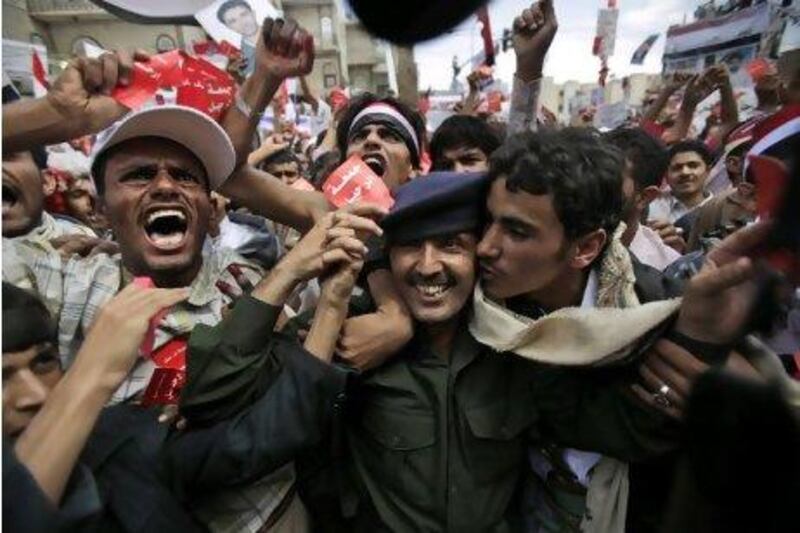SANA'A// Yemen's president, Ali Abdullah Saleh, told tens of thousands of supporters yesterday he would hand over power to "safe hands" but said he would not let "corrupts and anarchists" take control of the country.
Mr Saleh, who for weeks has faced protests calling for him to end his 32 years in power, said he was ready to leave office but he did not trust the opposition, who he called "drug dealers".
"We in leadership, we don't want power but we need to hand it over to safe hands, not to sick, hateful, corrupt, collaborator hands," Mr Saleh told the crowd, who carried pictures of the president and signs reading "No to chaos, yes to stability".
"We are steadfast and we will challenge them with all power we have," he told cheering supporters who gathered at al Sabeen Square near his presidential palace.
His remarks came one week after at least 53 protesters were killed and hundreds wounded during demonstrations by pro-Saleh supporters who opened fire from rooftops. The killings led to a large number of defections of military officers and cabinet members to the side of the protesters - including Major Gen Ali Mohsen al Ahmar, the commander of the army's 1st Armoured Division.
On the other side of the town, an even larger number converged for protests dubbed the "Day of Departure", chanting slogans calling for Mr Saleh's ouster and waving red cards emblazoned with the word "leave".
Anti-Saleh protesters slammed the president's speech, saying it was a "hallucination".
"The president is hallucinating before the departure. After bloodshed, he cannot choose how to leave. He must go now," said Nada Qanbar, a protester in the city of Taiz, in a telephone interview.
Mr Saleh renewed an offer to open dialogue with young people leading protests against him. He has made several concessions since the protests began but to no avail. Boosted by the swell of support, Yemen's hardened opposition turned down his offer on Wednesday to step down by the end of the year, saying they did not trust him. Instead they demanded he leave immediately and called for constitutional change that would limit presidential terms.
Mr Saleh's speech followed failed talks with Gen Moshen late on Thursday, according to a source close to Mohsen. The talks were held at the house of Abdu Raboo Mansur Hadi, the vice president, and were attended by Gerald Feierstein, the US ambassador to Yemen.
"The talks focused on three major issues which are that the president hands over power to the vice president, a national unity cabinet is formed and led by the opposition and that he should step down and leave with his family members and relatives with guarantees that they would not face legal prosecution," the source said on condition of anonymity because he was not authorised to speak to the media.
However, the source said, "Saleh makes agreements and then changes his mind".
Mr Saleh's power has been rapidly eroding over the past week. Spurred by the mass defection of the president's allies, people in cities across the country have begun to set up committees to oversee security in their regions. Seven districts in the southeastern province of Shabwa fell on Thursday to tribes that favour Saleh's ouster, according to local and security sources. The tribesmen forced the security forces out of the districts, allowing them to leave unharmed, the sources said.
Earlier in the capital yesterday, Security forces parked tanks and military vehicles close to the presidential palace and beefed up their presence around Saleh's ruling party building and the interior ministry. But the protesters returned to their rallying point, Change Square near Sana'a University, for a largely peaceful demonstration despite the emergency laws declared this week by Mr Saleh's government.
"We heard about the state of emergency in Egypt before, and the people there defeated the state of emergency," Iman Abdlraaqeeb Abad, said during Friday sermon, addressing people praying in the square.
"You, Yemeni people, have set a respectable image to the world. You gave up your weapons and united for change," Imam Abad said.
Pictures of the victims of last week's violence were displayed all over the square and on hundreds of tents. The protesters disseminated pamphlets listing their demands, including an immediate prosecution and trial of the perpetrators of violence against protests.
"The killers must be held accountable and be prosecuted. They will not escape the wrath of the people," Imam Abad said.
Two of the people who were killed last week were buried yesterday in a large burial procession by the protesters in a nearby cemetery.
Before, the noon prayers, a motor bike belonging to one of the protesters killed last week was auctioned and sold for more than 1 million rials (Dh18,000). The money will go to the victim's family.
Forces from Gen Moshen's armoured division were deployed across Change Square, clutching assault rifles and searching people trying to enter the area.
Hundreds of Saleh supporters attempted to enter the site and provoke the protesters, but were stopped by the army forces which fired in the air to push them back.





